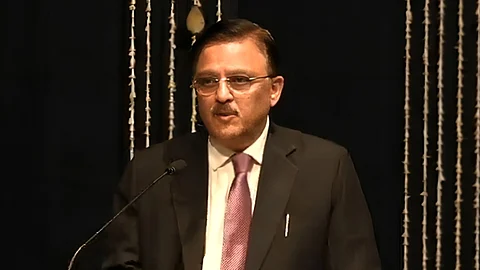Systematic study needed before claiming that only those close to ruling party get bail: Justice AS Oka
Courts can only decide what is legal and illegal while the press holds the power to say what is proper or improper, retired Supreme Court Justice Abhay Oka said on Friday.
He said that while both the judiciary and the press must remain vigilant to protect citizens' rights and the institutions created by the Constitution, the press also has the power to influence public opinion and is in a better position to shape societal perspectives.
“As a judge, I don’t have the power to say what that gentleman has said or what he has expressed, is right or wrong. That is not the function of the court. But, as I say, media and press, they can mold public opinion. So they can say, 'Look, what you have said may not be correct. It may not be proper, or appropriate, or inappropriate.' All those aspects can be considered by media. And therefore, this is the distinction between the role of media or the press and the court," he said.
Therefore, he urged the press and the judiciary to fulfill their duties to protect the Constitution.
“Unless the judiciary and the press come together and respect and uphold the ideas under the Constitution, the Preamble and assurance given to the citizens by the Preamble will be virtually redundant. The common duty of both judiciary and press is to uphold the Constitution and to protect the institutions created by the Constitution.”
The press must be vigilant, and press must come down very heavily against the violation of fundamental rights and injustice caused to the common man, he underscored.
Justice Oka was speaking at the Mumbai Press Club on the topic “Holding the Government to Account: The Role of Independent Judiciary and Free Press.”
Pertinently, he also declined to accept the claim that individuals like Umar Khalid and Stan Swamy were denied bail due to their lack of proximity to the ruling party, while others such as Ram Rahim are regularly granted parole because of their alleged closeness to those in power.
Justice Oka said that such a claim can be made only after a proper empirical study.
"A person, who is entitled to bail as per law, must get bail and there cannot be any dispute on this. However, the contention that those close to a ruling party get bail is a perception. It may be true also but a systematic study is required. Study is needed to see if only people close to ruling party get bail, and once such a study indicates that, then you can say so," the judge stated.
In response to a question about the recent recovery of burnt currency notes from premises of Allahabad High Court Justice Yashwant Varma, Justice Oka said he was part of the consultative process led by the Chief Justice of India in connection with the matter and hence, cannot comment on the merits of the case.
However, he said there are legal protections in place that prevent the registration of first information report (FIRs) against judges and that these protections exist for a reason.
He said the issue goes beyond the present issue of Justice Varma and relates to the broader question of how judges can function if legal safeguards are removed.
"There is a protection against registration of FIRs against judges. And someday, citizens have to think about it because if that protection is not there, how many FIRs could be registered against judges? In what manner could they discharge their duties? Someday, we have to answer this question… not you, but we,” he said.
Speaking further on the rights of press, Justice Oka said that the media has the right to criticize court's judgments but that criticism must be informed.
“I always believe that the media or the common man has the right to offer constructive criticism of judgments delivered by the courts. And when I say constructive criticism, it has to be studied criticism. You can’t just say, ‘I don’t like this judgment, therefore it is wrong'.”
He said judges do not respond to criticism and that restraint must be respected.
“If you criticize a politician or a bureaucrat, he can come back to the media and give a reply to that criticism. But we, as judges, exercise restraint self-restraint and therefore, we do not respond to criticism.”
In this regard, he referred to public criticism of former Chief Justices of India who had said that “judiciary is not expected to perform the role of opposition parties.”
Justice Oka said those statements were misunderstood.
“If the executive commits illegality, if the legislature crosses its limits and brings a legislation which infringes fundamental rights, then it is the duty of the court to strike down that law. What the Chief Justice meant was that courts are concerned only with legality or illegality, and whether a particular action, order or legislation is constitutional or unconstitutional.”
However, he conceded that both media and judiciary are not performing their duties independently.
“The same thing is said about the judiciary in some quarters. Even though I have been part of the judiciary for such a long time, I have to accept that this criticism does exist.”
The only solution to keep executive within the bounds is to have a fiercely independent media and judiciary, he said.

